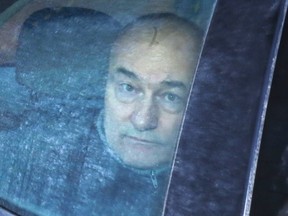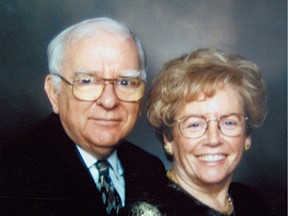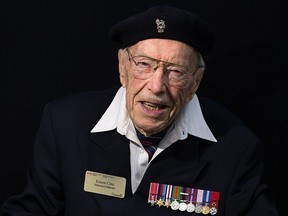The appellate judges reserved their decision on the murder conviction for a later date. The appeal for the attempted murder conviction is to be heard on Thursday.
Published Mar 05, 2024 • Last updated 14 hours ago • 5 minute read
 A 2015 file photo of Ian Bush. Photo by Mike Carroccetto /Postmedia files
A 2015 file photo of Ian Bush. Photo by Mike Carroccetto /Postmedia files
Ian Bush, the man convicted of murdering three seniors in one of Ottawa’s most notorious killings, who was then convicted of attempting to kill a 101-year-old war veteran, is now appealing those verdicts and seeking a new trial in his first-degree murder case.
Bush, 68, is serving a life sentence for the horrific murders of retired tax court judge Alban Garon, his wife, Raymonde, and their friend, Marie-Claire Beniskos, all in their seventies, who were found hogtied, severely beaten and suffocated to death inside their luxury condo on June 30, 2007, in a crime that shocked the city and baffled investigators for years.
Advertisement 2
This advertisement has not loaded yet, but your article continues below.
THIS CONTENT IS RESERVED FOR SUBSCRIBERS ONLY
Subscribe now to read the latest news in your city and across Canada.
Exclusive articles from Elizabeth Payne, David Pugliese, Andrew Duffy, Bruce Deachman and others. Plus, food reviews and event listings in the weekly newsletter, Ottawa, Out of Office.Unlimited online access to Ottawa Citizen and 15 news sites with one account.Ottawa Citizen ePaper, an electronic replica of the print edition to view on any device, share and comment on.Daily puzzles, including the New York Times Crossword.Support local journalism.
SUBSCRIBE TO UNLOCK MORE ARTICLES
Subscribe now to read the latest news in your city and across Canada.
Exclusive articles from Elizabeth Payne, David Pugliese, Andrew Duffy, Bruce Deachman and others. Plus, food reviews and event listings in the weekly newsletter, Ottawa, Out of Office.Unlimited online access to Ottawa Citizen and 15 news sites with one account.Ottawa Citizen ePaper, an electronic replica of the print edition to view on any device, share and comment on.Daily puzzles, including the New York Times Crossword.Support local journalism.
REGISTER / SIGN IN TO UNLOCK MORE ARTICLES
Create an account or sign in to continue with your reading experience.
Access articles from across Canada with one account.Share your thoughts and join the conversation in the comments.Enjoy additional articles per month.Get email updates from your favourite authors.
Sign In or Create an Account
or
Article content
Article content
Police cracked the cold case after Bush stormed into 101-year-old Ernest Côté’s condo in a 2014 home invasion that closely mirrored the killings seven years earlier, with Bush using fake City of Ottawa identification to gain access to Côté’s secure building.
Bush robbed and terrorized the Second World War veteran, tied his hands behind his back, taped his mouth shut, tightened a plastic bag over his head and left him to suffocate.
Côté survived the attack, broke free, cut a hole in the bag and called 911, all the while preserving the duct tape over his mouth that would serve as key evidence as detectives linked Bush to DNA left at both crime scenes.
The facts in both cases were so similar that the presiding judge in Bush’s triple-murder trial ruled that any evidence from the Côté case could not be heard by the jury out of fear it would prejudice them against Bush.
The jury ultimately took less than 90 minutes to deliberate in May 2017 before finding Bush guilty on three counts of first-degree murder for the “brutal, gratuitous” killings.
 Murder victims Alban Garon, a federal tax judge, and his wife Raymonde. Photo by CrimeStoppers /Handout
Murder victims Alban Garon, a federal tax judge, and his wife Raymonde. Photo by CrimeStoppers /Handout
Superior Court Justice Colin McKinnon chastised Bush for his contempt of court for refusing to stand for the judge during the proceedings and for dragging his family members through a trial and forcing them to testify. Bush was often seen grinning in the prisoners’ box, and he smiled as he was led out of the courtroom after being sentenced to three concurrent life sentences with no chance of parole for 25 years.
Advertisement 3
This advertisement has not loaded yet, but your article continues below.
Article content
“You have no shame whatsoever,” the judge told Bush at the close of the seven-week trial.
Bush didn’t take the stand in his own defence and shook his head when McKinnon afforded him the chance to speak after sentencing. His lawyer at the time, Geraldine Castle-Trudel, suggested in 2017 that Bush may launch an appeal.
 Murder victim Marie-Claire Beniskos. Photo by CrimeStoppers /Postmedia
Murder victim Marie-Claire Beniskos. Photo by CrimeStoppers /Postmedia
A separate jury found Bush guilty in December 2017 of attempted murder, robbery, forcible confinement and weapons charges for terrorizing and trying to kill Côté.
Côté died months after the vicious home invasion from unrelated causes.
On Tuesday, lawyers for Bush launched an appeal of his first-degree murder conviction in an Ontario Court of Appeal hearing in Toronto before a three-judge panel of Justice Ian Nordheimer, Justice Steve Coroza and Justice Jonathon George.
Bush, through lawyers Mark Halfyard and Samantha Bondoux, is scheduled to appear before Ontario’s highest court again on Thursday, when he is expected to launch an appeal of his attempted murder conviction in the Côté case.
During his high-profile murder trial, the jury heard that Bush was obsessed and enraged over a bitter tax dispute and targeted Alban Garon, the retired chief tax court judge, in the secure condominium where he and his wife lived on Riverside Drive. Bush may have been disguised as a delivery man or courier when he gained entry, according to the Crown’s theory.
Advertisement 4
This advertisement has not loaded yet, but your article continues below.
Article content
The judge’s wife and friend were killed for being in the wrong place at the wrong time. Bush put plastic bags over their heads and suffocated them after beating them. He put a noose around the judge’s neck and beat him violently about the head.
McKinnon described the crimes as “inexplicable” and steeped in “brutal, gratuitous violence.”
After linking Bush to the killings in 2015, police searched his home and seized a black leather bag that the Crown described as a “toolkit for murder,” including duct tape, rubber gloves, knives and plastic bags.
Ottawa police also found a handwritten journal containing anti-government ramblings and passages that described tax collectors as the “lowest form of humanity” and likened them to extortionists.
Police also found an apparent “hit list” and a four-page outline of a novel that described similar fictional crimes.
Halfyard argued the presiding judge made an error in his assessment of the evidentiary value of the black leather bag and its contents, which he said were “undated” when found by police more than seven years after the murders and contained items that had “no connection” to the crimes.
Advertisement 5
This advertisement has not loaded yet, but your article continues below.
Article content
“There’s no question in this case that the victims were brutally murdered and these killings were made all the more savage by the fact that all three victims were elderly and one was a former judicial officer,” Halfyard said Tuesday.
 Canadian Second World War veteran Ernest Côté. Photo by JOEL SAGET /AFP/Getty Images
Canadian Second World War veteran Ernest Côté. Photo by JOEL SAGET /AFP/Getty Images
Halfyard argued the Crown presented a “formidable, although circumstantial case” and said Tuesday’s appeal centred on “a case of Crown overreach that created an unfair trial.”
The cache of items in the black bag “made it appear that (Bush) was planning and maybe executing other home-invasion robberies and murders, painting him with the brush of general propensity,” Halfyard said.
The evidence, along with the judge’s failure to properly instruct the jury about the risk of prejudice the evidence would create, “tainted” the jury’s deliberations with “impermissible reasoning,” Halfyard argued.
Bondoux, Bush’s co-counsel, argued the trial judge also erred when he gave an “erroneous” instruction to the jury on the various pathways they could take in their deliberations to reach a guilty verdict on first-degree murder.
“We take issue with (McKinnon’s) instruction that, ‘If the jury was satisfied that (Bush) had planned and deliberated with one of the victims, then they could find him guilty of first-degree murder with respect to all of the victims,’” said Bondoux, who argued the point was “wrong in law.”
Advertisement 6
This advertisement has not loaded yet, but your article continues below.
Article content
Bush’s defence lawyers are seeking a new trial, but agreed with the panel of judges when it was suggested the first-degree murder convictions in the killings of Raymonde Garon and Marie-Claire Beniskos could instead be substituted for second-degree murder.
If the court opts for that remedy, Crown Counsel Greg Tweney told the court he would seek an identical period of parole ineligibility of 25 years for the potential second-degree murder convictions.
The appellate judges reserved their decision for a later date.
Our website is your destination for up-to-the-minute news, so make sure to bookmark our homepage and sign up for our newsletters so we can keep you informed.
Recommended from Editorial

‘You have no shame’: Ian Bush guilty in brutal killings of Ottawa seniors, including tax judge

Ottawa triple murderer found guilty of trying to kill Second World War veteran
Article content
>>> Read full article>>>
Copyright for syndicated content belongs to the linked Source : OttawaCitizen – https://ottawacitizen.com/news/ian-bush-seeking-new-trial-for-2007-triple-murder-2014-attempted-murder-of-war-veteran










